The development of eCommerce mobile applications is swiftly growing in the current digital era, providing users with accessible online stores that enhance their shopping experience.
In 2020, worldwide retail e-commerce revenues reached $4.20 trillion, and total earnings are anticipated to keep increasing in 2025, as shown below graph.
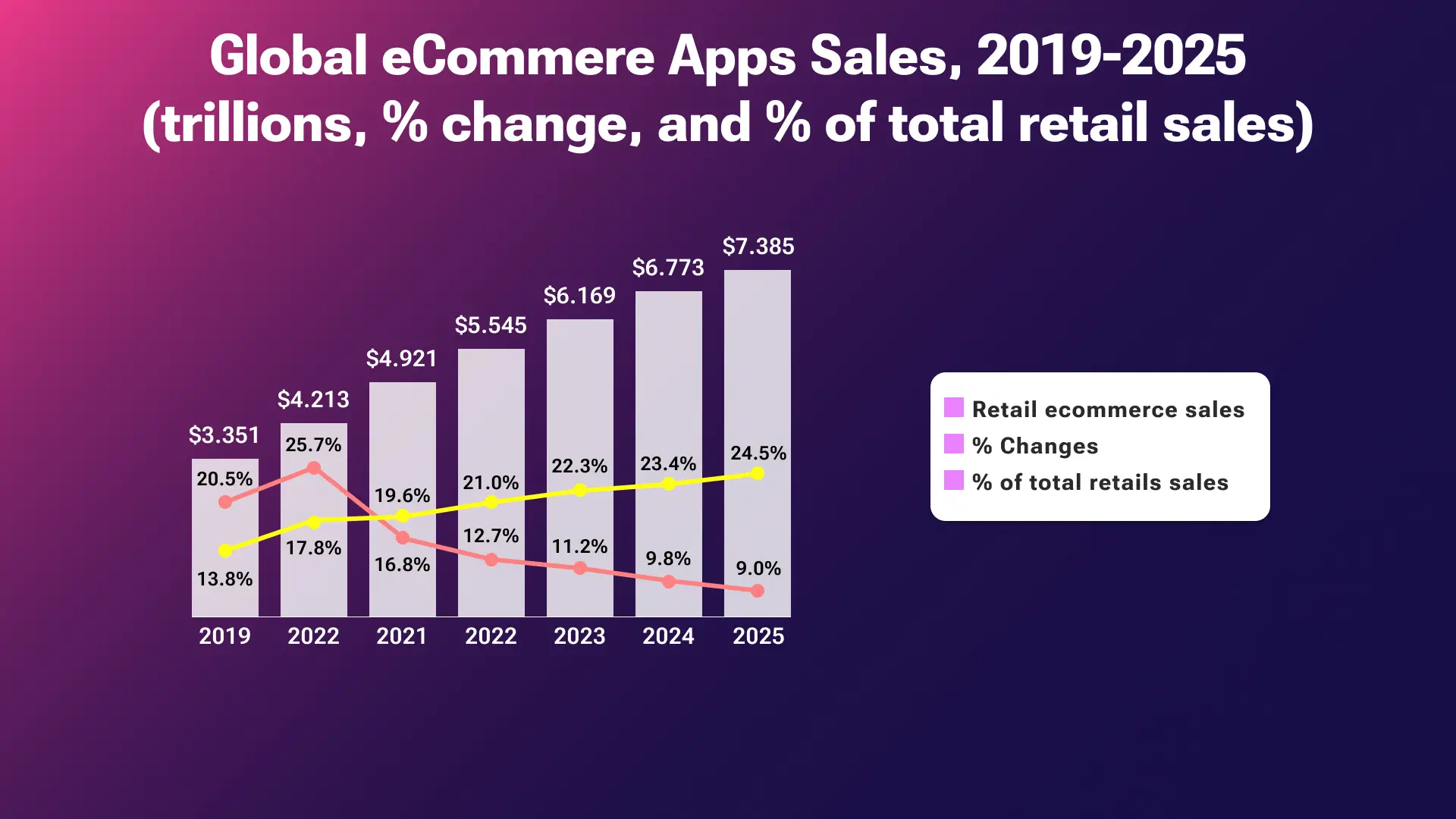
By investing in the development of creative applications for e-commerce businesses, entrepreneurs can experience a rise in overall revenue and conversion rates, improved customer engagement, and reach a larger audience.
In this eCommerce app development guide, we have compiled a complete A-Z resource to help you understand all the details necessary to create an e-commerce app.
What is eCommerce App Development?
eCommerce app development is the process of building specialized applications that allow businesses to sell their services or products over the Internet. It also enables users to look for, compare and purchase conveniently from their devices, ensuring a streamlined online shopping experience.
For business owners, an eCommerce app is not only an online store but also a tool to enhance their global audience reach and customer interactions.
eCommerce Application Market Growth Statistics
Undoubtedly the digital market is booming continuously thanks to eCommerce apps are at the forefront of revolutionizing the way businesses sell, and customers shop. These applications help retailers to reach global audiences, increase customer engagement and simplify transactions.
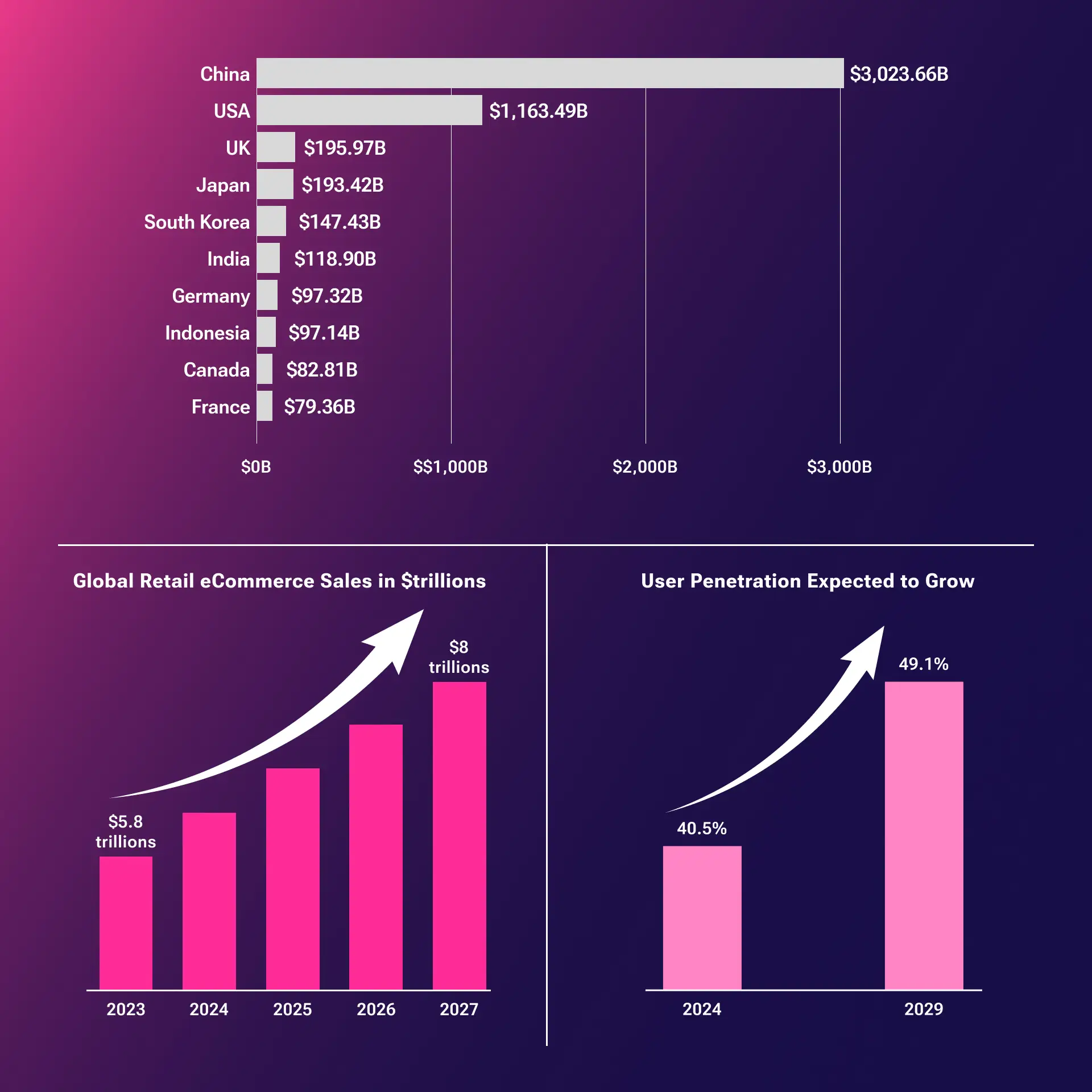
In 2023, global retail eCommerce sales reached an average of $5.8 trillion and are predicted to reach around $8 trillion by 2027, with 39% CAGR. It signifies that the online retail industry has a great opportunity for both Android and iOS eCommerce app development. Let’s see some facts and data on the eCommerce app market.
The worldwide retail eCommerce sector was assessed at $5,858.04 billion in 2023 and is expected to achieve a CAGR of 11.6% from 2024 to 2030.
7.6% of total retail in the US came from mobile ecommerce in 2023. In the United Kingdom, that percentage was 16.8%.
User penetration is projected to be 40.5% in 2024 and is anticipated to reach 49.1% by 2029.
The e-commerce giant Amazon, located in Seattle, is projected to exceed Alibaba in anticipated sales, achieving an impressive $1.2 trillion in online sales by the year 2027.
Having powerful and feature-rich eCommerce mobile apps is a profitable opportunity for businesses that want to thrive in competitive markets.
So, before investing in an eCommerce app development project, you need to know a few basic things about this transformative venture.
Types of eCommerce Applications for Development
With the rapid growth of the sector, a diverse array of eCommerce applications is emerging. So, if you are seeking to take your retail business online, you must know these three types of eCommerce applications. Choosing the right one for your business is essential for its growth and success.
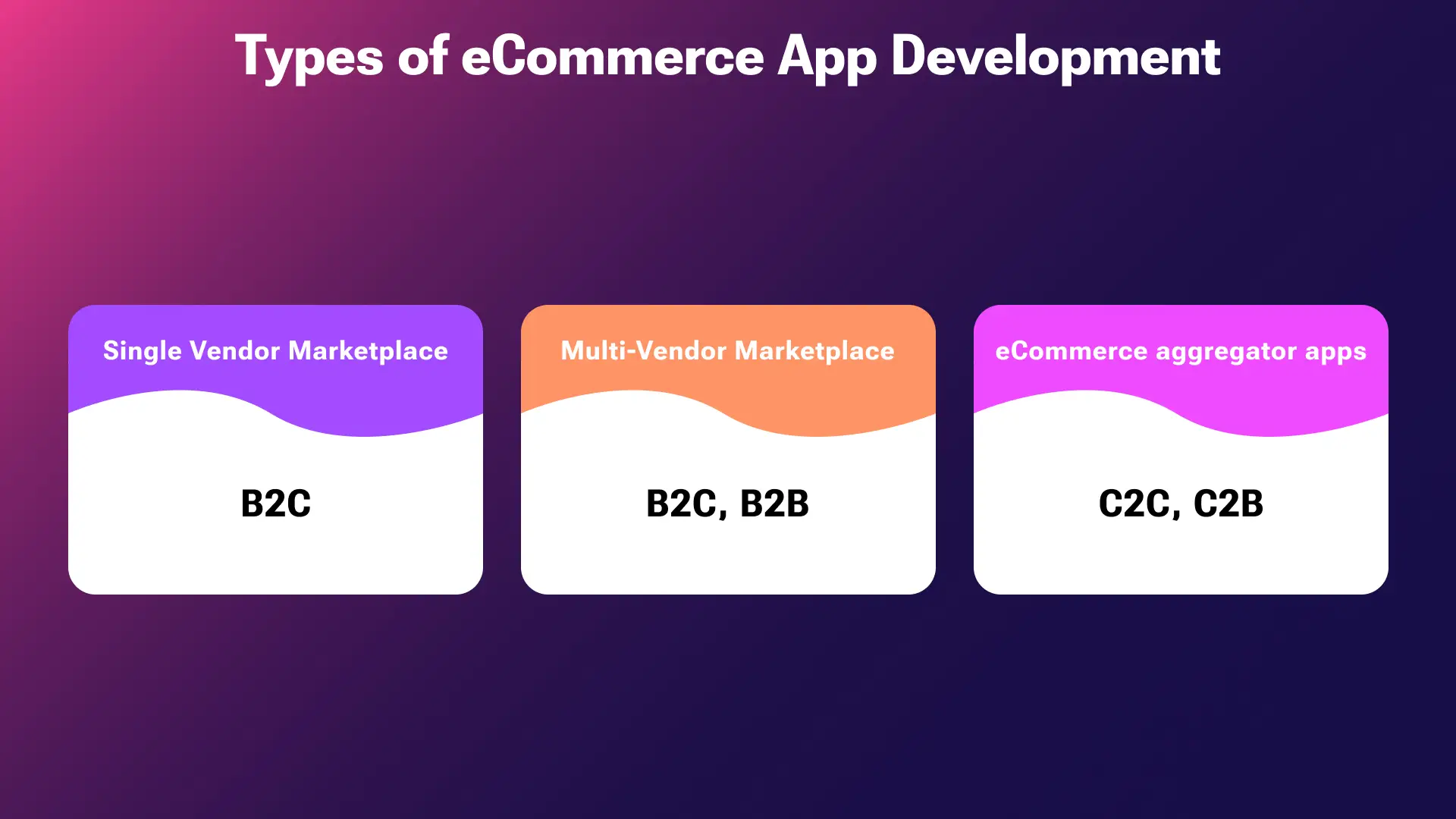
Single-vendor marketplace
B2C (Business-to-Consumer) is associated with single-vendor marketplaces, where a single seller sells products or services directly to customers. In this model, the business retains control of the retail marketplace, including inventory, pricing, product listing and customer support, creating a streamlined and personalized shopping experience.
Nike, H&M, and Zara are some of the most popular B2C eCommerce apps.
Multi-vendor marketplace
A multi-vendor ecommerce site is a platform that allows various sellers to offer their products or services. B2C and B2B are two models of these eCommerce app types. Among the most well-known instances of multi-vendor ecommerce marketplaces are Amazon, eBay, and Etsy.
eCommerce aggregator apps
Aggregator apps don’t have inventory or directly sell products. It’s a platform that connects buyers with service providers or sellers, ensuring overall quality and consistent experience. Uber, Zomato or Swiggy are examples of these apps.
C2C and C2B are two business models that come under such aggregator apps:
C2C eCommerce applications' main purpose is to facilitate purchasing and selling between end users. With these apps, users can trade in customized products easily. Popular examples of such Consumer-to-Consumer apps are OLX and Poshmark.
In this Consumer-to-Business app model, end users offer their services directly to businesses. Unlike product-based models, this approach is entirely service-oriented. Popular examples of such mobile eCommerce applications include Upwork and Freelancer.
Why Startup Enthusiasts Must Invest in eCommerce App Development?
Investing in building an eCommerce app project is a smart business move for both startup enthusiasts and established retailers. From thriving in today’s cutthroat market to increasing revenue, here are the top reasons why you should go for eCommerce app development.
79% of shoppers prefer online purchasing, having an eCommerce mobile app opens a huge market of potential customers. So, startups and retailers can expand their reach globally.
Mobile commerce is rising, with sales expected to reach $710 billion by 2025. eCommerce mobile apps already contribute over 67.2% of all online sales.
An amazing 29% of people globally make a mobile purchase at least once each week.
Improved brand awareness and customer loyalty are achievable through a superior mobile app experience.
Increased conversion rates due to push notifications, utilization of device options, and maintaining customer information.
Must-Have Features for eCommerce App Development
There are certain features your dedicated development team needs to include when building eCommerce applications. These key features provide customers with a smooth online shopping experience while ensuring your business growth.
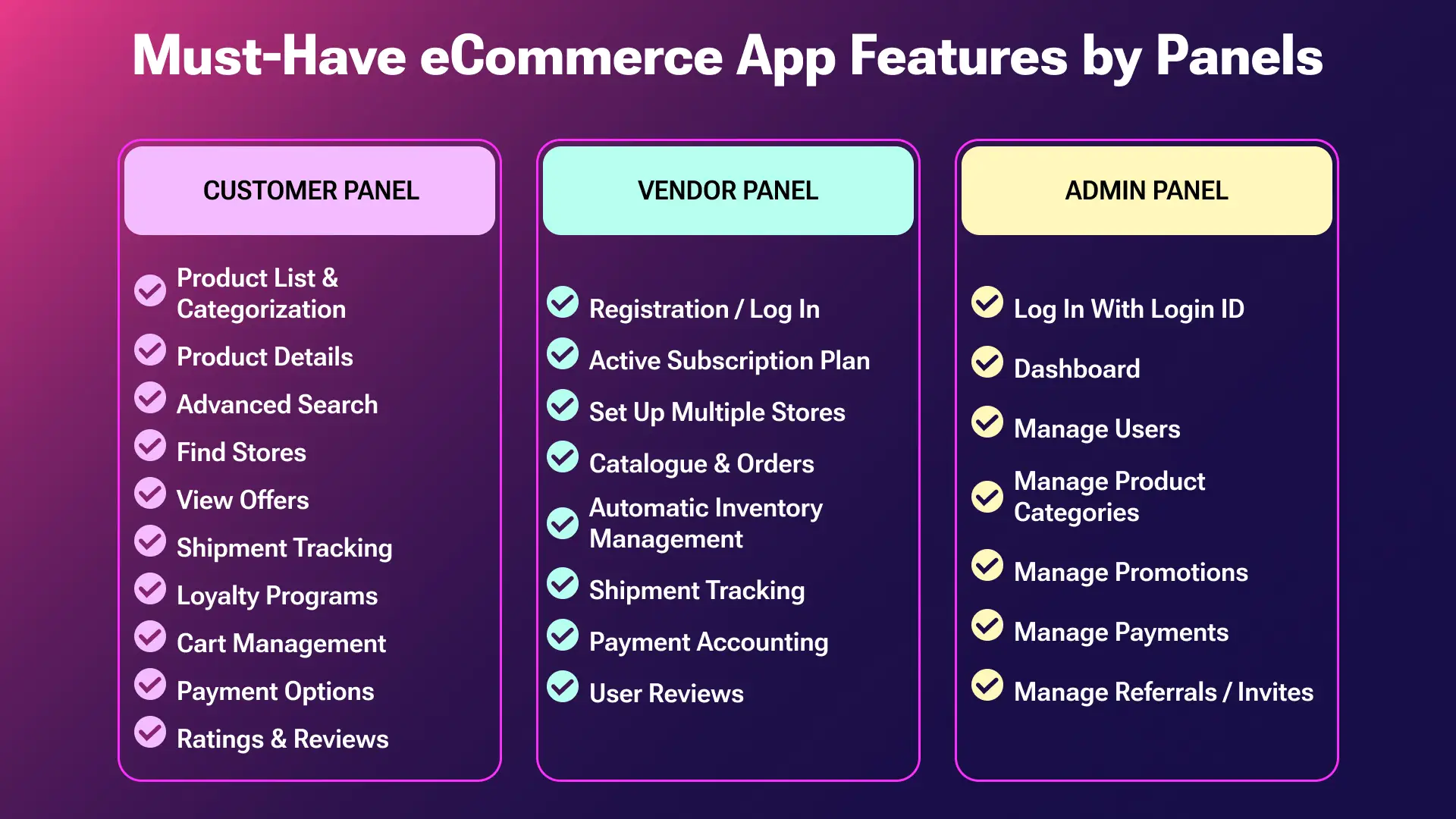
Features for an eCommerce app development can be separated into two sets - MVP-level features and an advanced set.
Let's look at both the eCommerce app features categories in detail.
MVP-level features to build an eCommerce app
Quick and Easy Registration
One of the most important features of an eCommerce app is quick and easy registration, allowing users to sign up and sign in effortlessly using their email, mobile number, or social media accounts. Incorporating a multi-factor authentication system, such as fingerprint scanning, can further enhance security.
Push Notification
The next must-have feature when you create an eCommerce app is a push notification. It is not only used for sending timely reminder messages about sales and new product launches but also for altering users about their order status, like the product has shipped or is out for delivery.
Product Filters
Another impactful eCommerce app feature when it comes to attaining a high user experience is search functionality and filter. It helps users quickly find specific products depending on different criteria like costs, brand, size and color.
We advise our clients to implement an AI-powered search and filter option that can understand the contexts, different spellings and long phrases.
Secure Payment Gateway
The next MVP eCommerce mobile app development feature when it comes to building customer trust is a secure payment option. Ensure your applications support multiple payment gateways like credit/debit cards, net banking, digital wallets, and UPIs to cater to all users.
Shopping Cart
Customers may add items for future purchases using a shopping cart. Features like applying promo codes, editing in-store pickup numbers and seamless checkout process are essential for online shoppers.
Delivery Status Tracking
The next MVP eCommerce app feature is delivery status tracking. After purchasing the product, buyers can track details within the apps, like how their order is moving and when it will be delivered to their address.
Customer Support
Customer support functionality is another MVP feature of the eCommerce mobile app. Based on a blend of automated chat and live assistance; users should find it simple to reach out to the store's personnel whenever they require help.
Social Media Integration
This functionality in eCommerce app creation enables users to effortlessly share items they are thinking of buying with friends or family on social media. By incorporating social media, users can purchase directly from Shopify stores, share their preferred items, and access or engage with their accounts effortlessly.
Advanced-level features of eCommerce web application development
Voice search
Incorporate voice search into eCommerce apps, especially with grocery and medicine delivery applications. It helps users to find products using voiceover commands, increasing convenience and accessibility.
In-built AR/VR try-on feature
Having an in-built AR/VR feature to consider for your eCommerce app development. It allows users to virtually try on products like clothing, accessories or furniture before shopping.
Multilingual
Advanced functionalities in eCommerce app creation that assist you in building a local fanbase. After identifying the target audience for your application, you can incorporate multilingual features into the app. It allows users to search for and purchase products in their preferred language.
Personalized recommendations
Integrate AI-enabled recommendation search and filter options to suggest products depending on several factors, including user preferences, browsing history and purchase behavior.
AI-Powered chatbots
Utilize AI-driven chatbots in eCommerce for tailored support, addressing frequent questions and providing instant product suggestions. AI-powered eCommerce support system results in a 300% boost in online orders and generate 30% more leads.
Cloud Computing
Cloud computing enables eCommerce businesses to swiftly adjust resources by adding or removing them as needed to meet fluctuations in traffic or other operational demands. This functionality enhances website performance through fast servers and content delivery networks (CDNs), guaranteeing rapid loading times and a smooth user experience.
Analytics and insights
Use sophisticated analytical tools to collect data regarding user behavior, sales results, and marketing efficiency. This advanced feature enables users to make data-driven decisions & optimize your e-commerce app for success.
Utilizing these MVPs and advanced features in your e-commerce mobile app allows you to create a robust & user-friendly platform that caters to your target audience’s needs and drives business growth.
Choosing the Right Technology Stack for Powerful eCommerce App Development
When it comes to selecting the right tech stack, every eCommerce app developer has their preferences in terms of both expertise and cost. At VLink, we use the following technology stacks to create a robust eCommerce app.
Frontend Technology - HTML, CSS, JS, Vue.js, Node.js, Angular, React.js
Back-end Technology - C#, Ruby, Java, Python, PHP, Spring
With innovative features and a powerful tech stack, you need a dedicated development team for your project. Whether you are planning to partner with an offshore eCommerce app development company or building a team from scratch, here are the following people:
Project manager
UIUX designers
Frontend developer
Backend developer
Database manager
QA experts
Delivery manager
How to Build an eCommerce App from Scratch?
eCommerce is one of the most extensive industries of the digital era, in terms of market size and applications. It makes the mobile commerce app development process a complex one. To simplify the process of creating an eCommerce app for iOS, Android and Web from scratch, you need to follow five development steps before hiring eCommerce mobile app developers.
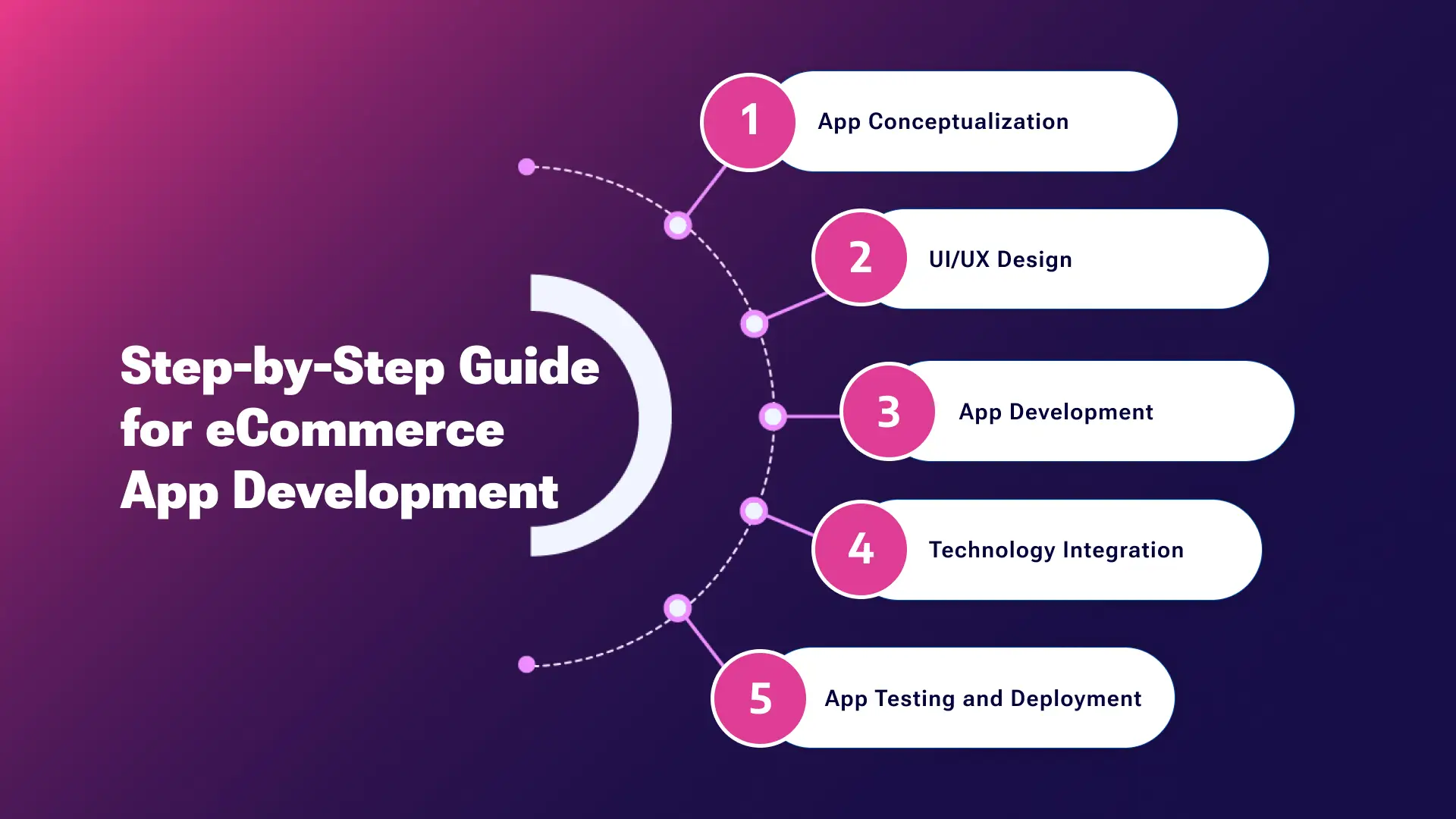
Let's check the comprehensive eCommerce app development guide in detail
App Conceptualization
A crucial phase in the development process of eCommerce mobile apps is app conceptualization. It requires conducting a comprehensive analysis of the market, customers, and competitors that reveal user demographics, the features they engage with, and the unique selling propositions you'll need to make your brand stay ahead in the competitive market.
UI/UX Design
After finalizing the concept, the next step that comes is user experience (UX) and user interface (UI) design for the app. You must prioritize eye-catching, appealing, user-friendly layouts and minimal UI/UX. Ensure your design structure has clear images, easy navigation, video buttons and an organic checkout flow.
App Development
After incorporating the required technologies and functionalities, it's time to focus on MVP development for a successful eCommerce app. It includes both front-end and back-end development. Make sure you hire an experienced eCommerce app developer to turn your ideas into a feature-rich application.
Technology Integration
The technology you plan to incorporate into your eCommerce app development process increases project duration, cost, and complexity. Here are the top next-gen retail tech trends you can add to your eCommerce mobile application--
The adoption of IoT (Internet of Things) in eCommerce development enhances order tracking, automates shipping and delivery, and optimizes revenue potential through a seamless omnichannel customer experience.
The scope for blockchain and NFTs in eCommerce app development is based on enhanced security due to distributed ledger technology, improved supply chain transparency through smart contracts, a rise in transactions, and a decreased need for intermediaries.
The role of Artificial Intelligence in retail applications often revolves around data utilization and user experience. It assists in developing an intuitive search mechanism, personalizing customer engagement, establishing an effective lead-generation process, and providing fully tailored chat support within the app.
AR and VR enable eCommerce consumers to see and test products from their homes prior to buying them. It significantly enhances the customer experience graph.
App Testing and Deployment
The next step of the eCommerce app development process is quality assurance and testing. It finds errors and ensures it functions on all platforms and all mobile devices. During this phase, the automation tester evaluates the app's functionality, usability, performance and security.
After properly testing the app, it's time to deploy it on the Play Store and App Store. Make sure your eCommerce app is free of any errors or bugs, ensuring smooth functioning.
By following these steps, you can create an eCommerce app. But here are several challenges you may face during eCommerce app development.
From security concerns and scalability issues to cross-platform compatibility, all of which require careful consideration to build a functional and user-friendly product.
Key Challenges of eCommerce App Development
Building an eCommerce app isn’t as easy as it sounds. Here are a few challenges you may face when working on eCommerce application development.
One of the biggest challenges of developing an e-commerce app is the security concerns. You must use highly advanced technologies and solid security protocols to ensure data security and protection. In addition, educating users about safe online practices is essential to prevent phishing attacks.
Supply chain disruption is another eCommerce app development challenge that can cause order delays. To mitigate these issues, you need to incorporate real-time tracking tools and robust logistics management.
Server downtimes or buggy updates can lead to significant operational disruptions, affecting user experience and sales. To overcome this, careful testing and routine maintenance are crucial.
Additionally, staying updated with rapidly evolving technology can be challenging. Partnering with an experienced eCommerce app development team is essential to ensure your app remains competitive and ready for the future.
eCommerce App Builder vs/ Custom eCommerce App Development
Selecting the appropriate e-commerce platform, such as Magento or Shopify, to launch an online store is a significant decision for business owners. Are you seeking a budget-friendly method or excited to create a robust and feature-rich app that could showcase your company's worth? Let’s compare custom eCommerce development with basic e-commerce app builders.
| Feature | Custom E-Commerce Development | E-Commerce App Builders |
| Customization | Fully customizable | Limited customization options |
| Scalability | Highly scalable to accommodate business growth and complex features. | Limited scalability, often restricted to predefined plans or add-ons. |
| Development Time | Longer development time | Quick deployment with ready-to-use templates and features. |
| Cost | Higher initial investment for development and maintenance. | Cost-effective, often with subscription-based pricing. |
| Technical Expertise Required | Requires an expert team for setup and ongoing support. | Minimal technical expertise needed; ideal for beginners. |
| Integration Options | Seamless integration with any third-party tools, APIs, and custom systems. | Limited integrations, often dependent on platform-supported plugins. |
| Ownership | Complete ownership of the code and platform. | Limited ownership; relies on the app builder’s infrastructure. |
| Performance Optimization | Highly optimized for performance and tailored to specific needs. | Performance depends on the app builder’s platform and capabilities. |
| Flexibility in Features | Freedom to implement advanced, unique features. | Limited to the features provided by the platform. |
| Long-Term Viability | Suitable for long-term growth and evolving business demands. | May not support complex requirements as the business expands. |
Developing eCommerce applications has emerged as the preferred option for retailers to connect with their target market and boost sales. But one question that arises in the mind of business owners - “What is the average eCommerce app development cost?”
How Much Does It Cost to Build an eCommerce App?
The cost to create an eCommerce app with basic features like a shopping cart and a secure payment gateway can range from $15,000 to $60,000. eCommerce application development with advanced functionalities like AI, IoT or AR can cost you around $80,000 to $1,20,000 or more.
The exact cost to build an eCommerce app depends on several factors, including project complexity, features and functionalities, UIUX design, tech stack, development team location and more.
Real-life Examples: Noon, Amazon, and Temu's Investment Strategies in App Development
Creating a thriving eCommerce application demands significant investment in technology, user experience, and market analysis. Platforms such as Noon, Amazon, and Temu showcase distinct strategies in app development tailored to their particular target audiences.
Noon’s Approach to App Development
Noon targets the Middle Eastern market, emphasizing regional language assistance, localized payment methods, and strong logistics integration. Their investment approach highlighted collaborations with local vendors and cutting-edge technologies such as AI-based product suggestions.
Cost to create an app like Noon may range from $150,000 to $300,000, influenced by the features and scope involved.
Amazon's Strategy
Amazon establishes the standard for scalable and universally uniform eCommerce platforms. The firm makes significant investments in AI, machine learning, and cloud computing to provide smooth user interactions, tailored suggestions, and effective logistics.
Creating an app similar to Amazon that offers global scalability, and advanced functionalities could require an investment of between $500,000 and $1 million, considering ongoing maintenance costs.
Temu’s Approach to Cost-Effectiveness
Temu appeals to cost-sensitive consumers by providing a simple yet efficient interface. They focus on enhancing app performance and cost-effective features, making it accessible to a broad audience. Cost to build an app like Temu might range from $100,000 to $250,000, based on integrations.
Although expenses differ based on scope and scale, the investment approaches of these platforms demonstrate that synchronizing development objectives with market demands is crucial for success.
We hope that the eCommerce app development guide helped you with the basics of how to build a successful app for eCommerce industry. If you’re looking for the best mobile eCommerce app development partner in the USA, VLink is the right choice!
Start Your eCommerce App Development Journey with VLink!
A proven track record, expert team and a great client list is what we, VLink, take pride in when it comes to building successful eCommerce apps. We are a leading eCommerce app development company that specializes in creating intuitive interfaces that make online shopping easy.
Our end-to-end eCommerce development services include mCommerce, B2B, B2C, C2B, C2C app development and multi-payment integration solutions. With these services, we have helped various established online stores achieve digital success.
Let’s move on to VLink’s case studies.
One of the recent projects is creating a hyper-local shopping app for an online electronics company. Our client contacted VLink for an eCommerce app that combines online retail & local shopping. By leveraging tech stacks and latest technologies, our experts deliver an app that makes it easy for the shopper and the store to have an online dialog that leads to a value-add for customers.
For another client, a well-known retailer, we created a retail mobile shopping app that would seamlessly work on any device and browser for an outstanding user experience using IBM Work Light. Our experienced eCommerce mobile app developers integrated several electronic payment gateways to offer secure payment options, and coupon solutions to provide discounts and promotions.
Although these are the most notable clients, we have worked on several other use cases across the wide eCommerce space, making us the reliable partner of multiple startups and popular brands.
So, if you’re also looking to create an eCommerce app like Amazon or Best Buy and want to know more about mobile app technology, speak to our experts today.










 Shivisha Patel
Shivisha Patel

















